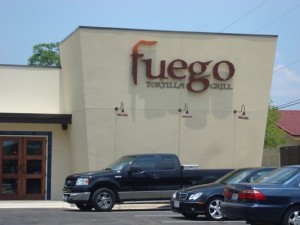Brazos County, Texas is back in the food safety news again. A year after the famed taco-eating press conference (“Since everybody, I’m sure, would want to know the name of the restaurant, I went by there right before I came. I got a beef taco, so here it is.”) the Brazos County Health Department has connected 30 cases of Salmonella Typhimurium Ohio to a Fuego’s Tortilla Grill. According to WTAW, a specific food source has yet to be identified but multiple food samples tested positive for the outbreak strain. 
Through the course of the food borne outbreak investigation, Fuego’s Tortilla Grill Restaurant became of statistical significance. Environmental samples were obtained from the restaurant 05/13/2014.
Today, the DSHS Laboratory reported that 4 of the 36 samples obtained from the restaurant tested positive for Ohio strain. A specific exposure source, such as food handling procedures, food supply or an infected employee has not been specifically identified, but is currently under investigation.
BCHD is working very closely with Fuego’s Restaurant to find the source of bacteria, and how to prevent this type of event from recurring. Fuego’s Restaurant’s management has been cooperative during this investigation, and has closed voluntarily today, when they received the news about the lab samples.
The Eagle, a College Station newspaper, also reported that Fuego’s Tortilla Grill had reopened following a through scrubbing.
“We’re owning up to this,” owner Paul Moler said following a news conference by the Brazos County Health Department. “We’re not a victim here.”
“All we can do is move forward, but I guarantee you Fuego will open its doors the best it’s ever been, and we will continue to give fresh, quality value at a great price. We’re not going to compromise. We’re not going to cut corners.”
On Friday, upon learning the results of the samples taken on May 13, Fuego voluntarily closed its doors for the day in order to clean and implement changes in food handling, as required by county health officials. Those requirements included a thorough cleaning of the premises by employees followed by an outside cleaning crew, the disposal of all open and prepared foods, as well as all cutting boards — some of which had tested positive for the bacteria.
“This happens,” Sullivan said, noting that Salmonella is a common bacteria found in most kitchens. “This happens with well-intentioned restaurants doing the best they can, so we work together … to come up with best practices and to learn from these types of things.”
Salmonella may be common in kitchens (especially on incoming ingredients and poorly washed hands of staff) but good restaurants have food safety management strategies to keep it off the plates of their patrons.

